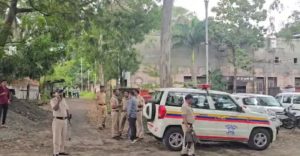Amid rising tensions and violent clashes along the Thai-Cambodian border, Thailand has imposed martial law in eight districts. The conflict centers around centuries-old Hindu temples in the disputed border region and has triggered one of the most serious escalations in years.
Why Martial Law Was Enforced
On July 25, 2025, the Thai government announced martial law in seven districts of Chanthaburi Province and one in Trat Province. These areas lie close to the Cambodian border, where clashes have intensified in recent days. The Thai Border Defense Command took this emergency step to ensure public safety and maintain control as fighting worsened.
What Sparked the Clashes
Tensions flared up after a Thai soldier was severely injured by a landmine in Nam Yuen district, Ubon Ratchathani. The situation quickly escalated as both countries exchanged heavy artillery and rocket fire. Thailand responded with airstrikes, while Cambodia retaliated using BM-21 rocket launchers and long-range artillery.
The fighting focused on disputed sites, especially around the Preah Vihear and Prasat Ta Muen Thom temples—ancient Hindu temples claimed by both nations.
Rising Civilian Casualties and Displacement
As violence spread to multiple locations across a 130-mile border stretch, civilian casualties mounted. Reports indicate at least 15–20 people, mainly Thai civilians, have been killed. Thousands have been injured or displaced on both sides.
Thailand has evacuated over 138,000 residents, while Cambodia has moved more than 20,000 people from conflict-prone zones. Public spaces like schools and temples have been converted into temporary shelters. In one instance, the Chang International Circuit racetrack in Buriram has become home to over 5,000 displaced people.
Accusations and Damages
Thailand has accused Cambodia of targeting civilian infrastructure such as schools, hospitals, and gas stations, calling the attacks “war crimes.” Cambodia, on the other hand, claims that Thai airstrikes have damaged the UNESCO World Heritage-listed Preah Vihear Temple and has alleged that Thailand used banned cluster munitions.
Both countries have taken their grievances to international forums, increasing global concern about the humanitarian and cultural damage being caused.
Political Drama Behind the Scenes
Beyond military clashes, there is a backdrop of political rivalry and broken alliances. The once-strong relationship between Thailand’s Shinawatra family and Cambodia’s Hun dynasty has fractured. A leaked phone call involving Thai Prime Minister Paetongtarn Shinawatra, daughter of former PM Thaksin Shinawatra, has added fuel to nationalist sentiments in both countries.
Her suspension by Thailand’s Constitutional Court amid the crisis has only deepened political uncertainty, with critics saying that national pride and internal politics are complicating diplomatic solutions.
International Mediation and Diplomatic Efforts
The international community is watching closely. The UN Security Council has convened an emergency meeting, while ASEAN, led by current chair Malaysia, has offered to mediate. Both the United States and China have urged restraint and proposed dialogue.
Though Cambodia initially accepted Malaysia’s ceasefire proposal, it soon withdrew its support. Thailand has so far preferred to address the crisis bilaterally, rejecting third-party mediation.
A Dangerous Echo of the Past
This conflict is the most severe since the 2008–2011 Thai-Cambodian border crisis, which also revolved around ownership of sacred temples. Despite the shared cultural significance of these heritage sites, they remain powerful symbols of national identity and territorial sovereignty.
As thousands remain displaced and diplomatic channels stall, the region teeters on the edge of a broader confrontation. The international community continues to push for peace, but the path forward remains uncertain.





More Stories
Shreyas Iyer’s Condition Sparks Concern: Internal Bleeding, ICU Stay After Freak Fielding Injury in Sydney
U.S. Congress Warns Trump: Tariffs on India Risk Strategic Partnership
Under‑Construction Tower Collapses in Chennai, Nine Missing After Disaster